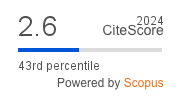Fault Tolerance for Composite Cloud Services: A MAS-based Novel Approach
DOI:
https://doi.org/10.4114/intartif.vol25iss69pp183-200Keywords:
Fault tolerance, Back recovery, Check point, Multi Agents System, Composition plans, Cloud service, Minimal path, Composite serviceAbstract
Several Cloud services may be composed in order to respond quickly to the users’ needs. Unfortunately, when running such a service some faults may occur. The outcome of fault control is a big challenge. In this paper, the authors propose a new approach based back recovery and multi-agent planning methods. The proposed architecture-based MAS (Multi-Agent System) is composed of two main types of Agents: a Composition Manager Agent (CMA) and a Supervisor Agent (SA). The role of the CMA is to create a set of plans as an oriented graph where the nodes are the Cloud services and the valued arcs represent the composition order of these services. This agent saves checkpoints (nodes) in a stable memory so that there is at least one possible path. However, the SA ensures that the running plan is working properly; otherwise, it informs the CMA to select another sub-plan. Experimental results show the performance of the proposed approach in terms of different metrics such as response time, cost, and total cost of different alternatives of cloud services.
Downloads
Metrics
Downloads
Published
How to Cite
Issue
Section
License
Copyright (c) 2022 Iberamia & The Authors

This work is licensed under a Creative Commons Attribution-NonCommercial 4.0 International License.
Open Access publishing.
Lic. under Creative Commons CC-BY-NC
Inteligencia Artificial (Ed. IBERAMIA)
ISSN: 1988-3064 (on line).
(C) IBERAMIA & The Authors










